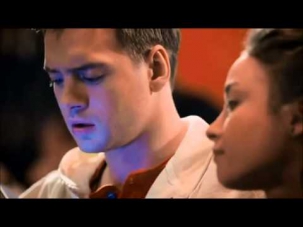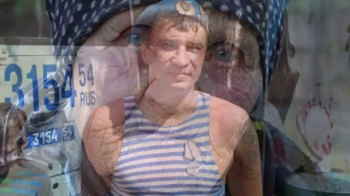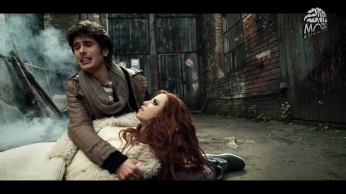Our Miss Brooks: Exchanging Gifts / Halloween Party / Elephant Mascot / The Party Line
Эксклюзивное видео на сайте deadmansongs.ru! Our Miss Brooks is an American situation comedy starring Eve Arden as a sardonic high school English teacher. It began as a radio show broadcast from 1948 to 1957. When the show was adapted to television 1952--56, it became one of the medium's earliest hits. In 1956, the sitcom was adapted for big screen in the film of the same name. Connie Constance Brooks Eve Arden, an English teacher at fictional Madison High School. Osgood Conklin Gale Gordon, blustery, gruff, crooked and unsympathetic Madison High principal, a near-constant pain to his faculty and students. Conklin was played by Joseph Forte in the show\'s first episode; Gordon succeeded him for the rest of the series\' run. Occasionally Conklin would rig competitions at the school--such as that for prom queen--so that his daughter Harriet would win. Walter Denton Richard Crenna, billed at the time as Dick Crenna, a Madison High student, well-intentioned and clumsy, with a nasally high, cracking voice, often driving Miss Brooks his self-professed favorite teacher to school in a broken-down jalopy. Miss Brooks' references to her own usually-in-the-shop car became one of the show's running gags. Philip Boynton Jeff Chandler on radio, billed sometimes under his birth name Ira Grossel; Robert Rockwell on both radio and television), Madison High biology teacher, the shy and often clueless object of Miss Brooks' affections. Margaret Davis Jane Morgan, Miss Brooks' absentminded landlady, whose two trademarks are a cat named Minerva, and a penchant for whipping up exotic and often inedible breakfasts. Harriet Conklin Gloria McMillan, Madison High student and daughter of principal Conklin. A sometime love interest for Walter Denton, Harriet was honest and guileless with none of her father's malevolence and dishonesty. Stretch Fabian Snodgrass Leonard Smith, dull-witted Madison High athletic star and Walter's best friend. Daisy Enright Mary Jane Croft, Madison High English teacher, and a scheming professional and romantic rival to Miss Brooks. Jacques Monet Gerald Mohr, a French teacher.Our Miss Brooks was a hit on radio from the outset; within eight months of its launch as a regular series, the show landed several honors, including four for Eve Arden, who won polls in four individual publications of the time. Arden had actually been the third choice to play the title role. Harry Ackerman, West Coast director of programming, wanted Shirley Booth for the part, but as he told historian Gerald Nachman many years later, he realized Booth was too focused on the underpaid downside of public school teaching at the time to have fun with the role.Lucille Ball was believed to have been the next choice, but she was already committed to My Favorite Husband and didn't audition. Chairman Bill Paley, who was friendly with Arden, persuaded her to audition for the part. With a slightly rewritten audition script--Osgood Conklin, for example, was originally written as a school board president but was now written as the incoming new Madison principal--Arden agreed to give the newly-revamped show a try.Produced by Larry Berns and written by director Al Lewis, Our Miss Brooks premiered on July 19, 1948. According to radio critic John Crosby, her lines were very "feline" in dialogue scenes with principal Conklin and would-be boyfriend Boynton, with sharp, witty comebacks. The interplay between the cast--blustery Conklin, nebbishy Denton, accommodating Harriet, absentminded Mrs. Davis, clueless Boynton, scheming Miss Enright--also received positive reviews.Arden won a radio listeners' poll by Radio Mirror magazine as the top ranking comedienne of 1948-49, receiving her award at the end of an Our Miss Brooks broadcast that March. "I'm certainly going to try in the coming months to merit the honor you've bestowed upon me, because I understand that if I win this two years in a row, I get to keep Mr. Boynton," she joked. But she was also a hit with the critics; a winter 1949 poll of newspaper and magazine radio editors taken by Motion Picture Daily named her the year's best radio comedienne.For its entire radio life, the show was sponsored by Colgate-Palmolive-Peet, promoting Palmolive soap, Lustre Creme shampoo and Toni hair care products. The radio series continued until 1957, a year after its television life ended. - с лучшим качеством и звучанием!
Our Miss Brooks is an American situation comedy starring Eve Arden as a sardonic high school English teacher. It began as a radio show broadcast from 1948 to 1957. When the show was adapted to television (1952--56), it became one of the medium's earliest hits. In 1956, the sitcom was adapted for big screen in the film of the same name. Connie (Constance) Brooks (Eve Arden), an English teacher at fictional Madison High School. Osgood Conklin (Gale Gordon), blustery, gruff, crooked and unsympathetic Madison High principal, a near-constant pain to his faculty and students. (Conklin was played by Joseph Forte in the show's first episode; Gordon succeeded him for the rest of the series' run.) Occasionally Conklin would rig competitions at the school--such as that for prom queen--so that his daughter Harriet would win. Walter Denton (Richard Crenna, billed at the time as Dick Crenna), a Madison High student, well-intentioned and clumsy, with a nasally high, cracking voice, often driving Miss Brooks (his self-professed favorite teacher) to school in a broken-down jalopy. Miss Brooks' references to her own usually-in-the-shop car became one of the show's running gags. Philip Boynton (Jeff Chandler on radio, billed sometimes under his birth name Ira Grossel); Robert Rockwell on both radio and television), Madison High biology teacher, the shy and often clueless object of Miss Brooks' affections. Margaret Davis (Jane Morgan), Miss Brooks' absentminded landlady, whose two trademarks are a cat named Minerva, and a penchant for whipping up exotic and often inedible breakfasts. Harriet Conklin (Gloria McMillan), Madison High student and daughter of principal Conklin. A sometime love interest for Walter Denton, Harriet was honest and guileless with none of her father's malevolence and dishonesty. Stretch (Fabian) Snodgrass (Leonard Smith), dull-witted Madison High athletic star and Walter's best friend. Daisy Enright (Mary Jane Croft), Madison High English teacher, and a scheming professional and romantic rival to Miss Brooks. Jacques Monet (Gerald Mohr), a French teacher.Our Miss Brooks was a hit on radio from the outset; within eight months of its launch as a regular series, the show landed several honors, including four for Eve Arden, who won polls in four individual publications of the time. Arden had actually been the third choice to play the title role. Harry Ackerman, West Coast director of programming, wanted Shirley Booth for the part, but as he told historian Gerald Nachman many years later, he realized Booth was too focused on the underpaid downside of public school teaching at the time to have fun with the role.Lucille Ball was believed to have been the next choice, but she was already committed to My Favorite Husband and didn't audition. Chairman Bill Paley, who was friendly with Arden, persuaded her to audition for the part. With a slightly rewritten audition script--Osgood Conklin, for example, was originally written as a school board president but was now written as the incoming new Madison principal--Arden agreed to give the newly-revamped show a try.Produced by Larry Berns and written by director Al Lewis, Our Miss Brooks premiered on July 19, 1948. According to radio critic John Crosby, her lines were very "feline" in dialogue scenes with principal Conklin and would-be boyfriend Boynton, with sharp, witty comebacks. The interplay between the cast--blustery Conklin, nebbishy Denton, accommodating Harriet, absentminded Mrs. Davis, clueless Boynton, scheming Miss Enright--also received positive reviews.Arden won a radio listeners' poll by Radio Mirror magazine as the top ranking comedienne of 1948-49, receiving her award at the end of an Our Miss Brooks broadcast that March. "I'm certainly going to try in the coming months to merit the honor you've bestowed upon me, because I understand that if I win this two years in a row, I get to keep Mr. Boynton," she joked. But she was also a hit with the critics; a winter 1949 poll of newspaper and magazine radio editors taken by Motion Picture Daily named her the year's best radio comedienne.For its entire radio life, the show was sponsored by Colgate-Palmolive-Peet, promoting Palmolive soap, Lustre Creme shampoo and Toni hair care products. The radio series continued until 1957, a year after its television life ended.














